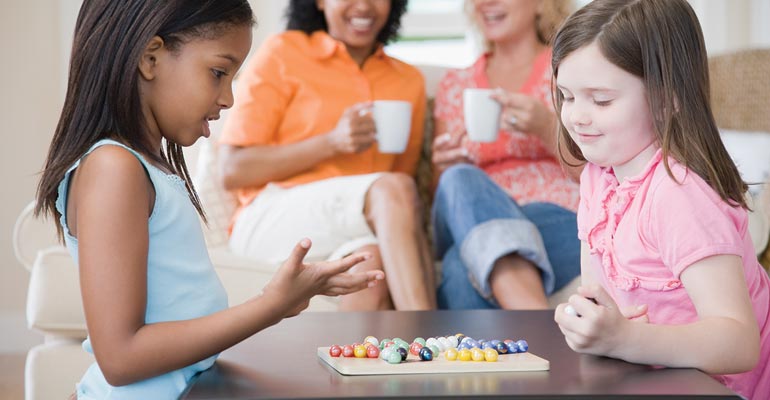What role can parents play in their children’s friendships? How do you teach the basics of social skills? How does adoption crop up, if at all, in our kids’ peer relationships? Friendship expert and adoptive dad Fred Frankel spoke with AF to answer these questions and more.
Fred Frankel, Ph.D., is one of the foremost experts on friendships and social skills in children, from toddlers through teenagers. He’s a professor in the Department of Psychiatry and Biobehavioral Sciences at UCLA, where he also founded and directs the UCLA Children’s Friendship Program. Frankel’s latest book, Friends Forever: How Parents Can Help Their Kids Make and Keep Good Friends, is indispensible reading for any parent. He and his wife, Susan, are the parents of two children adopted from Kazakhstan.
Adoptive Families: What is the basis of firm friendships? How would you describe a “good friend” for a child in the preschool or early elementary school years?
Fred Frankel: In a way, friendship is a child’s first experience with true love. It’s a relationship where you put someone else on an equal footing with yourself. Developmentally, preschoolers aren’t that verbal and don’t have full control over their behavior. So friendships in those very early years tend to be fleeting — kids play side by side, rather than with each other. Children begin to form more mature friendships in kindergarten or first grade, when they have interests in common and play well together.
Kids don’t start using conversation as the basis of friendships until later in elementary school, sometime between fourth and sixth grade. This might happen a little earlier with girls than boys.
Essentially, if you raise a nice kid, other children will want to be friends with her.
AF: How can you tell if kids are playing well together? What are some specific signs that parents can look for?
FF: Watch for dynamic play, whether you’re at home or at a playground. This means children should essentially be constantly engaged, playing cooperatively, with a lot of give and take. You shouldn’t see one child being bossy — deciding what to play, making the rules, dictating the roles for each child — and the other compliant. Even young children can learn to be “good sports”: negotiate rules, take turns, take the game they’re playing seriously (not clown around or break the rules), praise other children (“Nice shot!”), try to have fun (instead of trying to win), and not get upset if they don’t win.
In first or second grade, children who are good friends shouldn’t be having more than an occasional squabble. By third grade, disagreements should be extremely rare or non-existent.
AF: How can a parent help her young child find children to be friends with?
FF: I’m a big proponent of the neighborhood school, because logistics do play into this. You don’t have to drive for an hour to get your child to school, or to go on play dates with kids he meets at school.
AF: Are there any friendship issues unique to children who were adopted? What about kids who have any discernible difference, whether race, a disability, and so on?
FF: As much as possible, you want to normalize adoption and race for your child, socially and within your family. Your child may have an easier time of it if he doesn’t feel he stands out. Sometimes, of course, parents can’t do much about this. It may not be possible to live in a diverse neighborhood and find a diverse school, where there are different ethnicities, different family arrangements.
This is also why talking about adoption at home is so important. Your child should be able to give a concise summary of how your family came to be: “My birth mom couldn’t take care of me. My parents are so happy they adopted me, and we’ll always be a family.” Young children get to know each other by starting to play together (acting in concert after watching each other) rather than introducing themselves and making conversation.
So, in those early years, peers may ask simple questions about race or adoption (“Why don’t you look like your mom?” “Where are you from?”), but should be satisfied with the matter-of-fact answers your child has rehearsed. Nosy or repeated statements about race or background may be more indicative of what that child’s parents or other adults in his life are saying to him; if you choose your child’s friends wisely, that child won’t be one of them.
For the most part, a child will begin to form friendships before differences are an issue. When kids get a little older and start teasing each other, having a group of friends will be a protective factor. Mostly, it comes down to how well parents help their child make friends and be a good friend early on, and how nice the child is.
AF: How can parents facilitate budding friendships?
FF: Cross-examine your child at the end of each day. Find out whom he plays with, whom he likes. You can follow up by talking with the teacher about this: “Andy said that he plays with Carlos a lot at school. Do the boys seem to get along well? Do they ever get into arguments?” Make sure your child and the potential friend he names really do get along well, and don’t just happen to play together frequently. If it seems like a good match, contact the other child’s parents and set up a play date.
AF: What’s the basis of a good play date?
FF: Select friends wisely, using the input you gathered from your child and the teacher. Start play dates out short. If it’s a disaster, you’re not stuck with it for a long time.
AF: Are some toys or activities better for encouraging friendships?
FF: Interactive toys help nurture friendships. An interactive toy is one that’s only fun if it’s played with someone else, like balls, jump ropes, hopscotch. At home, board games, playing with dolls, and pretend play get kids involved with each other. Don’t let your child watch TV or play video games (these discourage interaction), or engage in a solitary activity, like reading, while on a play date. Shared interests, like a sport or a dance class, also encourage a friendship, and help your child meet others who like to do the same things.
AF: How involved should a parent be in helping her child select friends? When does a parent’s influence in this matter begin to wane?
FF: Totally involved. You should help choose them. Friendship is a choice, so parent and child should work together to select friends. Then, have your child’s friends over for one-on-one play dates and observe how they play together. Do they interact peacefully? That’s the test. When kids are younger, it’s a simple fact that better friends have less conflict.
If you don’t think a peer seems like a good friend choice, just don’t invite him or her over again. If your child insists, you can say, “Let’s invite someone else over first. Then we can try again with Julie.” And children will get this. If they experience a better play date, have a better time with another child, they won’t be attracted to the stormier relationship. [Think your child is having trouble with a friend? See “Tell Me About It,” below, for advice on encouraging him to open up.]
By fourth or fifth grade, a child will stop letting her parent have much say in who her friends are.
AF: What will a child look for in a friend? Should we encourage our kids to be friends with children of the same race or other adoptees?
FF: People seek out others who are similar to themselves. Early on, this may happen on an unconscious level. For example, we’ve often found that one of our daughters will become good friends with another child, and as we learn more about the child’s background, we’re amazed at the similarities in our families. Of course, organized activities (a sport, a class) also offer opportunities to meet other kids and provide ready topics of conversation.
It’s nice for our kids to know other adopted kids, but having adoption in common won’t guarantee a friendship. Remember to select friends with your child in mind. You might want to encourage your child to be friends with other kids in an adoption group, or other kids who share the same race or birth culture, but it should ultimately depend on how well the children get along.
AF: Quality or quantity? What about a child who seems to have only one real friend?
FF: Quality. One study looked at the number of friends children had at age 12, and how well-adjusted they were later in life. Just one or two close friends made the difference. On the other hand, in the here and now, having only one close friend is putting all your eggs in one basket. If that’s the case for your child, you probably want to try to help him make a few more friends.
AF: When does popularity start becoming an issue? How can parents talk with their children about friendships vs. popularity?
FF: This seems to start by second grade. But it’s interesting — if you ask a child who’s “popular” and who’s “well liked,” you’ll get different answers. How can you keep popularity from becoming an issue? Don’t appear to be interested in it. Instead, ask your child who’s nice or kind, whom he likes to play with, who gets in trouble, who’s hard to play with, and so on.
AF: When would a child benefit from a formal friendship training program vs. coaching from a parent?
FF: Sometimes, social deficits are massive. If your child has occasional problems with friends, you can help. But if he’s routinely rejected, the only child not invited to birthday parties, or never has play dates, he may need more help.
Kids with special needs may need help, too. At our center, for example, we’ve held groups just for kids who have been exposed to alcohol prenatally. We’ve also found that about 60 percent of the kids who attend our sessions have ADHD. And if a child spent time in a baby home, for example, she probably learned that the only way to get her needs met was to scream as loud as she could. Studies have shown that some kids who faced early deprivation have an enlarged amygdala, which is the center of emotions, both positive and negative. The task, especially for kids who were not picked up at all and had very little interaction, is to unlearn that. A warm, caring environment will do a lot, but it will take a while for the brain to catch up.
AF: What are the long-term benefits of solid friendships for children?
FF: Kids with friends are less likely to drop out of school or to use drugs. If you have the skills to make friends, you can make them in new situations. The life change from high school to college is a dramatic leap, and a whole new social situation. But, essentially, the same skills apply. A child who gained social competence earlier on will do fine when she’s off on her own. Friendships moderate life stress; we all do better when we’ve got a few good friends.

